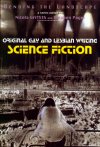reviewed by Mark R. Kelly
 Bending the Landscape: Science Fiction
Bending the Landscape: Science Fiction
(book profile)
L. Timmel Duchamp, ''Dance at the Edge''
On a colony world (or perhaps alternate Earth) Emma Permisson grows from babyhood to adolescence, perceiving the ''edge'', a glimpse of a starscape or another world, which most others can't see and which Emma soon learns is naughty to talk about. She develops a crush on another girl, Viola, who also senses what she calls ''seams'' and who has elaborate explanations for what they are and why the knowledge is secret. This story uses the experience of being gay as an example of SF's familiar idea of estrangement; in this society, it's another social inhibition, another protocol for dealing with the world, one that must be balanced with other protocols. Emma's vulnerability and insecurity are familiar to anyone who spent adolescence desperately trying to figure out how the world works.
Ellen Klages, ''Time Gypsy''
Carol McCullough, a UC Berkeley physicist whose hero is Dr. Sara Clarke, a physicist in the 1950s who died mysteriously before presenting a paper on ''practical tempokinetics'', is given the opportunity the travel back in time to meet Clarke and obtain a copy of that final paper. The SF elements in this story are generic, but the contrast between attitudes about homosexuality in the 1950s compared to the 1990s are eye-opening, and vividly described. The time travel plot is resolved cleverly and surprisingly.
Jim Grimsley, ''Free in Asveroth''
On a world being exploited by humans for a valuable crop, native alien jumpers are confined to pens. Three of them escape, fleeing from the two-legs' flying machines and hiding in the ruins of their warrens. The oppression of one group by another is the pertinent theme, soulfully depicted, especially in the sad songs the jumpers sing about the nightfall of their race.
Mark W. Tiedemann, ''Surfaces''
Jacob, the lone human representative on the planet Canolus, receives two shipwrecked humans, a diplomat and her son Bridger, who claim to have been attacked by the native scherzi of this world. Jacob is in no position to argue, disgraced for his bohemian past, but he suspects that devious political machinations are at work. In the context of the book the story is weak -- the gay element is only present as a means of discrediting Jacob -- but an ambiguously edgy relationship between Jacob and Bridger and some interesting aliens make the story work.
Keith Hartmann, ''Sex, Guns, and Baptists''
In a religiously oppressive near future, a woman hires a private detective to find out if her fiancé is given to homosexual tendencies. The PI plants a hustler in a hotel lobby and watches as the fiancé takes the hustler up to his room. The best SF idea in the book is in this story -- the idea that prenatal tests to determine if a fetus is gay would result in a gay population consisting of Catholics and Baptists -- though it's unfortunately incidental to an otherwise tightly written, suspenseful melodrama.
Ralph A. Sperry, ''On Vacation''
Virtually the only story in the book that might be called cheerful, this tale involves two alien life partners who visit Earth incognito, renting a house on Cape Cod already booked by a divorcé and his son. The man is compelled by their presence, ''blasted by their masculinity'', and finds himself acting as the couple's houseboy, while his son is charmed by their ability to fix his toy robot and any other appliance in sight. The story has a fannish awkwardness, but in the context of a book of gloomy visions of repressive societies, its corny charm is refreshing.
(Mon 19 Oct 98)


 Bending the Landscape: Science Fiction
Bending the Landscape: Science Fiction